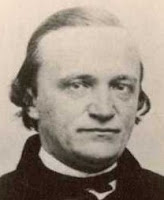 [2025-04-13: updated several links; 2024-09-27: updated links to Triglotta;2023-08-14: updated links to bookofconcord.org; 2020-04-09: added note in red on grape juice vs. wine]
[2025-04-13: updated several links; 2024-09-27: updated links to Triglotta;2023-08-14: updated links to bookofconcord.org; 2020-04-09: added note in red on grape juice vs. wine]A number of writings have appeared concerning a recently released Concordia Commentary by James Voelz and Christopher Mitchell, Mark 8:27-16:20 (CPH 2019). A negative Amazon review by Kelly D. Smith ("Good Exegesis but Author denies Scripture") provides a pertinent quote from the chief author of this Commentary, Dr. James W. Voelz of Concordia Seminary. Mr. Smith states (emphasis mine): "Voelz, in his own words, believes,
'Mark 16:9-20 should not be adopted as the genuine ending of the Gospel according to Mark and its exclusion from the Second Gospel should occasion no difficulties for Lutherans who have committed themselves to the confessional documents of the Book of Concord.' (page 1237)"
Mr. Smith has done a service to the Church by publishing this quote. It opens up the question for all Lutherans as to what impact a loss of Mark 16:9-20 would mean to the Book of Concord, or the "Lutheran Confessions". Others have written to defend against Voelz's denial of this "Long Ending" (LE), but I want to provide the reader with an online clickable index to the exact portions that would have to be omitted or changed from the Lutheran Book of Concord. I am including in the following table not only the hyperlinks to the BookOfConcord (Triglotta) references, but also the page numbers of the currently sold English printed versions of the Lutheran Book of Concord:
Is it not strange that the LC-MS, which promotes its sacramental theology, would also remove one of the foundational Bible verses that support it – one of the verses that constitutes what Luther calls the "outward Word"? Hmmm... maybe the LC-MS is not so "sacramental" after all? (The LCMS also now teaches that the use of grape juice, instead of wine, is not forbidden in the Lord's Supper, contrary to orthodox Lutheran teaching. Confessing, p. 887, fn 131; cp CTQ 1981, v. 45,1, p. 77-80, 🔗, CTM 1939, v. 10,5 p 321-330, 🔗); Pastor and People, p. 57-58) [2020-04-09: see also BJS essay by Karl Weber, "Fruit of Which Vine?".] —
Is Orthodoxy "docetic"? Not the LC-MS…
Of greater importance in this controversy is the doctrine of Holy Scripture promoted by the teachers of the Lutheran Church-Missouri Synod today. Prof. Voelz does not teach the Divinity of Holy Scripture. (see here) He and his LC-MS officially teach that the Bible is divine and human. He explicitly charges those who hold to the full Divinity (e.g. Luther, Walther, etc.) as "docetic" (see this blog post, What Does This Mean?, p. 242 [Internet Archive]). This charge is meant to be comparable to the other "Docetism" heresy of early Christianity. But that heresy was not about the Holy Scripture, it was about the Person of Christ. Voelz holds to a low view of Holy Scripture indicating his (and the LC-MS's) theology and exegesis. It is exactly the charge by German theologians against orthodox teaching in Walther's day, against the old Synodical Conference. So it is no wonder that he makes his assertion of "no difficulties for Lutherans" because he would have Lutherans believe and follow him, as a high scholar, rather than to "bow or kneel before… words" as Luther instructs his hearers to do.
No, neither Dr. James Voelz nor his LC-MS are worthy to be listened to in this matter. I will listen to the Reformers, I will listen to the Lutheran Confessions. I will only listen to those who "believe, teach, and confess" the Divinity of Holy Scripture (i.e. sola Scriptura): 2 Tim. 3:16, 2 Peter 1:20-21.
= = = = = = = After the break below, read Paul E. Kretzmann's Commentary on this matter: = = = = = = =














